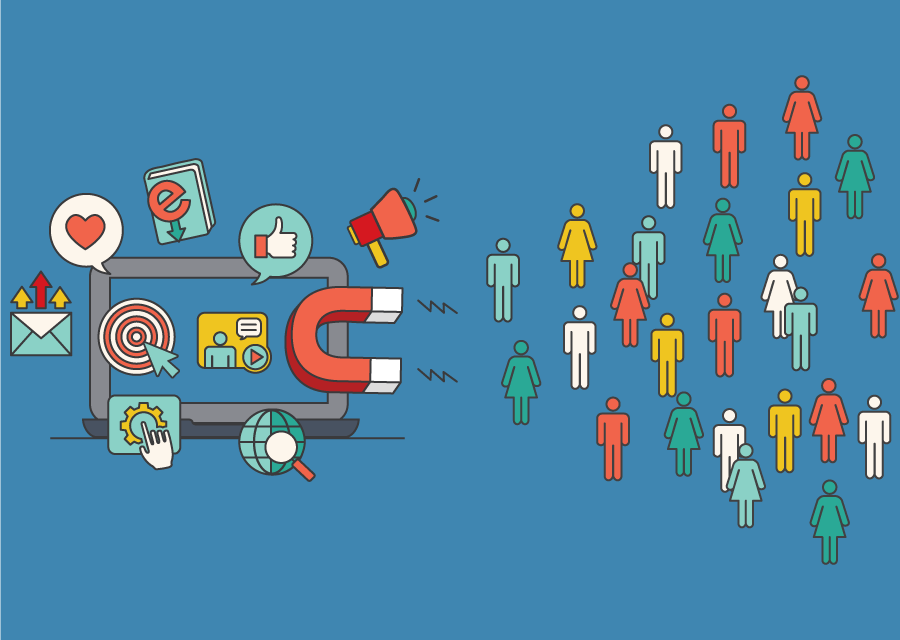A B2B Guide on How to Grow Your Business Through Digital Marketing
A great digital marketing strategy can help you boost brand awareness, generate leads, drive conversions, and grow your business. But when it comes to authentic, effective strategies in the world of business-to-business (B2B) digital marketing, the rules are slightly different than that of business-to-consumer (B2C) marketing.
Digital content and digital marketing are having a major “moment” right now when it comes to B2B brands. In fact, in 2021 buyers are reading 40% more content assets than they were at the beginning of 2020, and 59 percent of senior executives are opting to watch digital video content over digital text content.
So, how can you make the most of your digital marketing efforts to grow your brand? Here’s the scoop on B2B digital marketing.
Build a Robust Website That Will Grow Your Business For You
What is your website but an online marketing tool? There are plenty of ways to turn your website into a marketing machine; one that does more for you. Ideally, your website should help share what you do best, attract more leads, convert these leads into customers, and then help you track the entire process throughout the sales funnel.
How do you do this? With dynamic content that captures a visitor’s attention, inspires them to enter their contact information, and with tools like marketing emails, digital media, posts on social media, and ad campaigns that all attract leads to take action on your website. This can be accomplished with features like:
- A landing page that informs visitors and inspires them to enter their information and become leads.
- Forms that capture valuable information about leads (including who they work for) and funnel them into your customer relationship management (CRM) tool to nurture your relationship with businesses and the people who work for them.
- Forms for potential leads to join marketing email campaigns—and the tools to analyze their efficacy to engage with leads, send out offers, and provide valuable, relevant, personalized information.
- Information-rich, updated content designed to boost your search engine optimization and establish your brand as an authority.
- Links to your social media pages and backlinks to other locations on your site to drive traffic and further engagement.
With the right features (and an intuitive CRM tool), your website is an invaluable asset that can drive business, attract new visitors, engage with new leads, and further your relationships with them. It’s an invaluable asset that shouldn’t be underestimated.
Take Advantage of Search Engine Optimization Through Content Marketing
Content marketing is an indispensable asset that can be used to boost your website traffic and gain new business, but only if search engines can find it; the two go hand in hand. As Forbes so aptly put it, “SEO without content marketing is like a body without a soul.” The article continued, “In particular, SEO is actually strategized around content marketing since every website needs words, articles, substance, keywords, etc. In order to be successful, both must go hand in hand.”
Keyword strategies are an essential part of any search engine marketing strategy, but only if they are part of a well-thought-out content marketing plan. This content doesn’t just exist to draw visitors to your site though; it’s an opportunity to establish your business as an authority other brands can turn to; it’s a chance to establish trust.
To truly build an SEO-centered content marketing strategy that grows your business requires consistency and fresh, exciting, creative content that pulls readers in, is indexed by search engines, and ranks high on a search engine results page. This calls for a great deal of research, including:
- Effective keywords
- Influential topics
- Buyer personas and what they are looking for
Search engine optimized content marketing should be designed to help potential clients solve problems. This, combined with notable keywords, is how search engines like Google establish how relevant a particular page or piece of content is. Your digital marketing strategy should include brainstorming sessions to come up with creative content ideas, then thoughtfully embedding essential keywords.
Content marketing can be so much more than blog posts. In addition to an active blog, content marketing can include things like:
- Infographics
- Podcasts (complete with keyword-rich overviews or transcripts)
- Video content marketing
- SEO-focused paid ads
Your content marketing plans should be carefully curated, with thought given to key performance indicators (KPIs), budget, content channels, type of content, and budget. Once your content marketing plan is set in motion, don’t forget to analyze your results to continue to refine and improve your content strategy as you go.
Make the Most of Online and Offline Marketing
Your digital marketing strategy doesn’t have to be limited solely to online efforts. If you haven’t yet, now is the time to coordinate your online and offline marketing efforts to maximize the efficiency of both.
This can be a powerful combination. Forty-seven percent of companies use offline marketing to increase online traffic and improve engagement, and 65 percent of companies use digital marketing strategies to improve engagement away from a screen.
- Sending offline activity online by including QR codes and landing pages
- Collecting email addresses at in-person events to build your email list for your next marketing campaign
- Creating custom discount codes and coupons that can only be accessed through targeted landing pages
- Sending leads to your social media channels after downloading primary content offers
- Building specific URLs and landing pages for offline marketing campaigns and events, which allows you to track activity and analyze results
- Provide content offers or discounts for businesses that can only be used via an online platform
By combining your offline and online marketing efforts, you expand your opportunities to connect with potential businesses that you might not be able to reach.
Connect with Leads Via Email Marketing Campaigns
HubSpot shares that email marketing is one of the most effective ways to reach both individual consumers and business customers. As a matter of fact, ninety-three percent of B2B marketing campaigns use email to connect with their target audience.
Why is email marketing so worthwhile for B2B brands? B2B customers are looking to make logically sound, informed decisions. They want to see a positive return on their investment; they want to know that you can help grow their business and/or improve their operations. For this reason, B2B email marketing campaigns are most successful when they appeal most to the things that resonate with your potential customers: Time, money, and resources.
Keep in mind that when it comes to B2B email marketing campaigns, it's estimated that people send and receive an average of 121 business emails per day. Your emails should be succinct and carefully crafted to capture your audience’s attention. Here are a few best practices to maximize the impact of your marketing emails:
- Create intriguing subject lines
- Keep your emails focused to one CTA per email
- Segment your email lists to reach targeted audiences
- Use responsive email designs
- Don’t shy away from cold emails
Don’t forget that 80 percent of people check their emails on their mobile devices, so be sure to check that your emails load quickly. Emails that fail to load correctly are often deleted right away!
Engage in Social Media Marketing
Social media is so much more than a place to share pictures and memories—it’s become an important marketing tool for B2C and B2B companies alike. LinkedIn in particular is poised to become an integral tool for B2B brands, with over 740 million active users. In 2020, LinkedIn saw:
- A 50 percent increase in content in Q3
- A 40 percent increase in marketing solutions in Q4 year-over-year
- A 158 percent increase in LinkedIn Live streams since February 2020
- 663.3 million active users reached by LinkedIn Ads as of January 2020
Plus, LinkedIn integrates with CRM tools like HubSpot to streamline lead generation.
Eighty-three percent of B2B brands use social media for their digital advertising efforts to grow their business. Which platforms are the most effective to bolster engagement with B2B audiences? In order, the top three platforms for B2B companies to connect with their target audience are as follows:
Your social network is a great way to share your content and attract visitors to view your website, offer helpful information, and boost your SEO.
Great examples of B2B social media marketing campaigns include:
- Sharing multimedia content
- Highlighting employees and their contributions to your company
- Establishing a brand voice
- Offering customer support
- Engage in meaningful conversations with customers, leads, and industry changemakers
Use PPC Campaigns Thoughtfully
A Pay-Per-Click (PPC) campaign is a useful way to round out your digital marketing efforts. Because of the costs associated, a PPC campaign doesn’t have to be the cornerstone of your digital marketing plan, but it can help bolster your existing digital presence. If you aren’t seeing the kind of results you want, a PPC campaign can help support your efforts.
The best thing about a PPC campaign? You only pay when someone takes interest in your business. The Digital Marketing Institute recommends using a paid media campaign tracker to follow your ad spending, track your performance, and get a better idea of what is working in your PPC campaign and what might require some adjustment.
Certain platforms like Facebook offer flexibility in how you pay, whether that be in engagement, impressions, clicks, and more. This means you can better segment your audience to reach those you want to reach and see better results.
ThinkFuel Can Help
When it comes to digital marketing, B2B digital marketing is its own unique genre; it’s different from the traditional marketing efforts that B2C brands rely on every day. At ThinkFuel, we pride ourselves on understanding what it truly means to help B2B companies and small businesses expand their reach, share vital information about their products and services, establish authority, grow their brand, and raise their bottom line.
If you’re seeking business growth, start with marketing. And if you’re seeking business growth specific to the world of B2B? Think ThinkFuel. To learn more about how we can help you grow your business, connect with our team today!
Table of contents
Share this
You May Also Like
These Related Stories

HubSpot CMS: Why It's Time To Make the Move

Why I Don’t Love Twitter Ads for B2B Lead Generation
